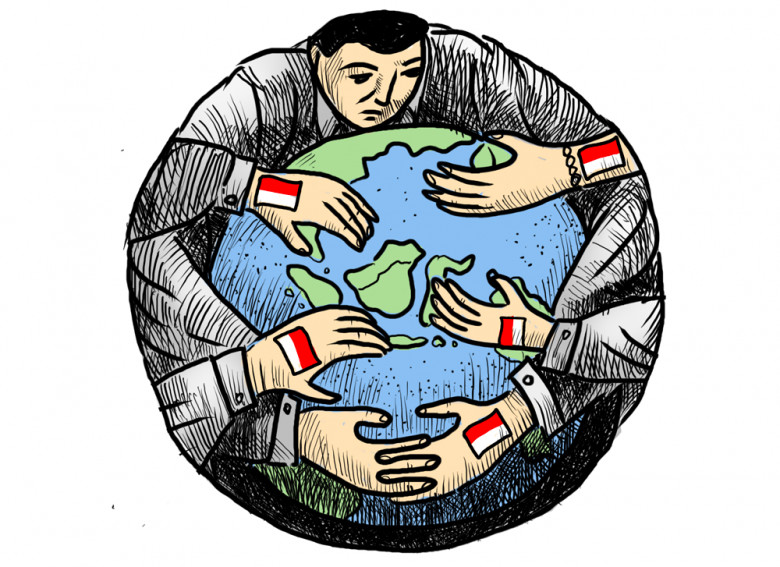Popular Reads
Top Results
Can't find what you're looking for?
View all search resultsPopular Reads
Top Results
Can't find what you're looking for?
View all search resultsStudent diaspora urge govt to form sustainable partnership with Indonesian academics abroad
In a webinar hosted by the Overseas Indonesian Students Association Alliance (PPI-Dunia), several Indonesian students living abroad voiced their ideas on how to optimize the role of Indonesian scholars in national development.
Change text size
Gift Premium Articles
to Anyone
M
embers of the Indonesian diaspora, particularly in academia, have called on the government to boost its engagement with academics abroad by rolling out a more sustainable strategic partnership with them and fully utilize the skills of citizens living overseas.
In a webinar hosted by the Overseas Indonesian Students Association Alliance (PPI-Dunia), several Indonesian students living abroad voiced their ideas on how to optimize the role of Indonesian scholars in national development.
Fajar Haqi Ismaya, the coordinator of PPI-Dunia in the United States and Europe, said there was little engagement or sustainable and holistic cooperation made by the government to engage with the diaspora, particularly students and scholars.
He said he believed they could offer “brain gain” or intellectual advantage to Indonesia instead of other countries.
“There’s a lot of collaboration between, for instance, PPI-Dunia and the government, but unfortunately, they are still partially conducted. There is no sustainable blueprint from the government to cooperate with PPI Dunia or the student diaspora in general to achieve Indonesia’s Vision 2045 [national development master plan],” Haqi said.
Separately, Theodorus Alvin, the coordinator of PPI-Dunia in Asia and Oceania, said that to achieve Indonesia’s Vision 2045, there were many things that Indonesia should prepare to embark on its journey.
Utilizing resources from Indonesian scholar communities abroad was pivotal, he said.
Read also: Govt mulls issuing diaspora bonds in November
“For instance, to invest in research.”
In the past few years, President Joko "Jokowi" Widodo has been calling on Indonesians abroad to return home and utilize their experience to help build the nation.
In his first speech since his reelection in October 2019, he repeated the call, pledging to support the diaspora through the establishment of an institution to pool the talents of diaspora members who can contribute to Indonesia's development. However, the plan has yet to be realized.
The government has said it would increase its outreach to strengthen the diaspora’s inclusion. At home, it has pledged to provide room at government agencies to ensure that diaspora affairs are included in their policies.
However, Haqi and Theo were doubtful as to whether the government was able to give a platform to Indonesian human resources living abroad.
Read also: Indonesian diaspora joins fight against pandemic at home
According to data from PPI-Dunia, around 75,500 Indonesian students are currently studying overseas, but not all of them can be absorbed by sectors at home.
“The [intellectual] advantages would possibly go to countries that we are studying in,” Haqi said.
He added that the concern was how the government could play its role as a regulator.
“It is not like we are asking for jobs, but it’s about a cooperation blueprint, “ he said, adding that the diaspora could still give their contribution even from outside the country.
Theo echoed the statement, saying that Indonesian students and scholars did not have to bring their knowledge back home.
Read also: Indonesia seeks to persuade diaspora to come home
“Right now, you can transfer your knowledge or just practice the knowledge either in Indonesia or abroad,” said Theo, who is pursuing his bachelor’s degree in Japan.
“As part of the Indonesian diaspora, basically you can contribute from anywhere in the world. In Japan, for instance, there are many Indonesian researchers and they hold high positions,” he added.
Theo added that the most realistic approach was to establish international cooperation, such as joint research.
“The other solution is to engage with private sectors [at home] because they have relatively more resources.”
Meanwhile, Haqi said he believed that the government could start by making a student diaspora community, for instance, or an organization such as PPI-Dunia, as a strategic partner to engage the Indonesian diaspora — especially scholars — across the world.










